A Son’s 43-Year Wait: Ragheed al-Tatari’s Release from Syrian Prison
Waill Tatari’s life took an unexpected turn when he received a brief, emotional phone call. It was his father, Ragheed al-Tatari, speaking to him for the first time in years, not from the confines of a Syrian prison, but as a free man. This two-minute conversation concluded a 43-year chapter of agonizing separation, punctuated by dashed hopes and the constant fear for his father’s well-being. Ragheed, a former Syrian Air Force pilot, had been imprisoned in 1981 for refusing to bomb civilian areas in Homs, a testament to his unwavering principles in the face of the Assad regime’s brutality. His release came as a consequence of a rebel takeover of the Syrian government, a dramatic shift in power that opened the prison doors for Ragheed and countless other political prisoners. The call was short, cut short by the chaotic noise surrounding Ragheed, but it signified a monumental shift in Waill’s life. The simple statement from his father’s lawyer, that Ragheed was having breakfast by the beach, brought Waill to tears. The mundane act, so readily taken for granted, resonated deeply, highlighting the decades of freedom denied to his father.
Waill’s story is inextricably bound to his father’s fate. Born while his father was already in prison, his childhood was marked by the looming absence of a parent. His mother, Salma Mousa, pregnant with Waill at the time of Ragheed’s arrest in 1980, carried the burden of raising a child alone while tirelessly advocating for her husband’s release. The family endured years of uncertainty, moving between countries, seeking refuge and safety, all the while clinging to the hope of reunification. Their communication with Ragheed was limited, infrequent, and often fraught with difficulty, relying on third parties and crackly landlines. Their last direct contact had been eight years prior, a faint connection across vast distances that offered little solace. Waill, a graphic designer, computer game developer, and app designer, had to flee Syria himself in 2013 due to death threats related to his involvement in the anti-Assad movement. This marked not only his exile but also the last time he saw his father face-to-face during a prison visit in Damascus. The fear and uncertainty that plagued his father now shadowed him as well.
Ragheed’s imprisonment spanned the reigns of both Hafez al-Assad and his son, Bashar al-Assad, highlighting the enduring nature of the regime’s oppression. His case became emblematic of the thousands of political prisoners languishing in Syria’s notorious prisons, including the infamous Sednaya prison, a place synonymous with torture and extrajudicial killings. The Association of Detainees and Missing Persons of Sednaya Prison championed Ragheed’s case, advocating for his release and bringing international attention to the plight of those unjustly incarcerated. Their accounts detail Ragheed’s attempts to seek asylum after his initial arrest, his journey through Jordan and Egypt, and his eventual capture upon return to Syria. The fall of the Assad regime, spearheaded by the Islamist group Hayat Tahrir al-Sham, while presenting its own set of complexities, finally unlocked the prison gates that had held Ragheed captive for so long.
The reunion Waill so desperately craved has been tinged with both joy and sorrow. The absence of his mother, Salma, who passed away in 2019 in Malaysia, is a stark reminder of the time stolen and the opportunities lost. The family sought refuge in Malaysia due to its relaxed visa requirements for Syrians, another indication of the displacement and uncertainty that shaped their lives. Now, it is Waill and his uncle, waiting in Damascus, who carry the torch of hope, eager to reconnect with Ragheed and piece together the fragments of their family history. The stories surrounding Ragheed’s time in prison are numerous and often conflicting, adding another layer of anticipation to their impending reunion. Waill is determined to hear his father’s account firsthand, understanding that the truth, however painful, must be told by the one who lived it.
The future remains uncertain for both Waill and Ragheed. The fall of the Assad regime, while liberating, has ushered in a new era of unpredictability in Syria. The landscape, both politically and socially, is in flux, and the implications for the future are far-reaching. Waill’s trepidation is understandable, given the tumultuous history of his homeland and the personal risks he has faced. Yet, his overriding emotion is one of joy and relief. The childhood dream of having his father home, a dream so often deferred, is finally within reach. The simple anticipation of celebrating his father’s birthday, which falls on Christmas Eve, carries a profound significance, symbolizing the hope for a brighter future, a future where family and freedom are no longer distant aspirations.
Waill’s story exemplifies the human cost of political oppression. It underscores the resilience of individuals and families in the face of unimaginable hardship, their unwavering hope in the darkest of times, and the enduring power of human connection. Ragheed’s release is not just a personal triumph; it’s a symbol of hope for countless others who have suffered under the Assad regime, a testament to the enduring spirit of those who refuse to be silenced. As Syria navigates its post-Assad era, stories like Waill’s and Ragheed’s will be crucial in understanding the long shadow of oppression and the arduous journey towards healing and rebuilding.











